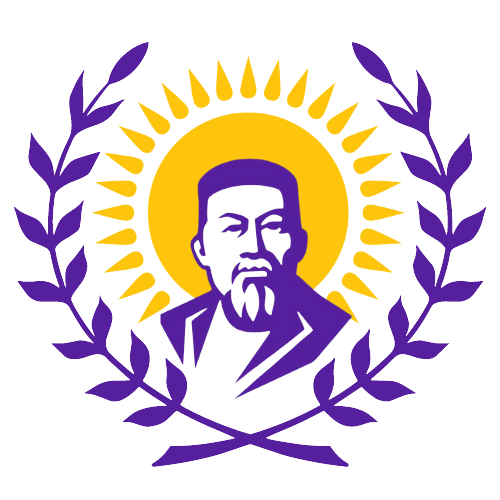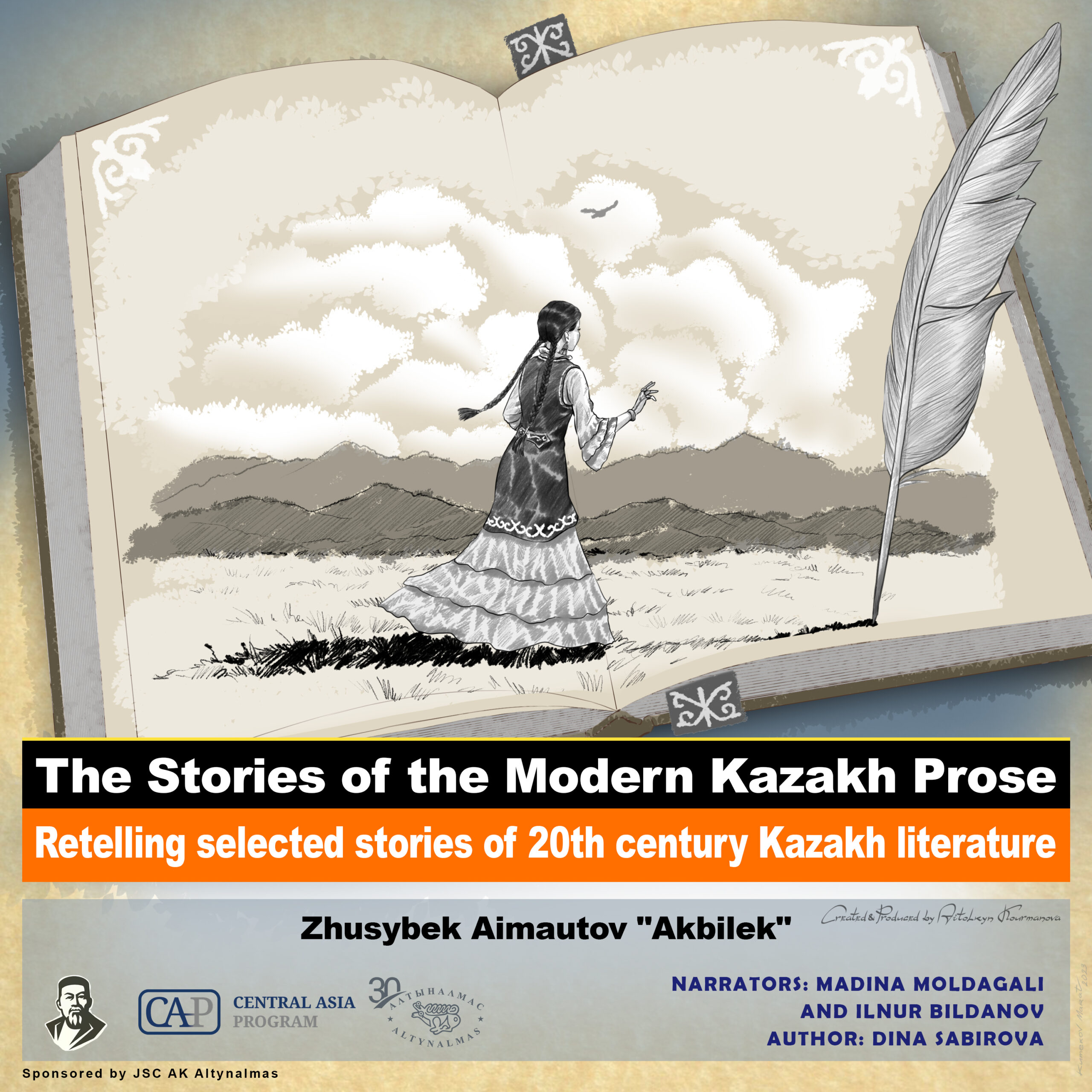
Zhusipbek Aimautov, a teacher by training, served as the editor-in-chief of Abai magazine and the newspaper Kazak tili. He also left a significant literary legacy as the author of the novels Kartkozha (1926) and Akbilek, as well as a number of other works. Akbilek is a psychological novel that was first published in 1927 in the magazine Equal Rights for Women.
Aimautov was accused of counter-revolutionary activities and shot in 1931. His works were banned, so his books were removed from libraries and destroyed. The novel Akbilek was only rehabilitated and republished in 1989. It was one of the first Kazakh novels to describe Kazakh village life during the massive social transformations of the early 20th century. We are guided through these events by following the difficult fate of Akbilek, a girl who has the misfortune of being born both beautiful and rich. She soon becomes a victim of men, every one of whom seems to betray her. Yet she remains strong despite the worst of humiliations, fighting fiercely for her right to be happy.
Full text
On the beautiful and mysterious Lake Markakol in East Kazakhstan live the family of the wealthy Mamyrbai, including his daughter, Akbilek. Their village is peaceful—until one dark night, Russian soldiers from the White Army who have been fighting in the Civil War arrive in the village. Threatening villagers at gunpoint, they search for Mamyrbay’s daughter, Akbilek. Hearing the voices, Mamyrbay’s wife takes her daughter and runs to hide her in the lowlands—but to no avail. Three Russian soldiers find Akbilek. Her mother cannot save her: a Russian soldier shoots the defenseless woman in the chest as she tries to protect her child.
The soldiers throw Akbilek on a horse and ride away. Akbilek’s beloved betrothed, Bekbolat, gives chase, but the Russians begin shooting and escape.
In the Whites’ camp, as Akbilek shivers from fear, one of the soldiers discusses politics. The son of a noble family, he has been sent to this foreign land against his will and ordered to fight the Kazakhs, who have the right to be resentful against Russians. But the soldier is not particularly interested in the Kazakhs, ill-equipped and ill-prepared for conflict as they are. As Whites retreated in the Civil War, they robbed and killed the Kazakhs without a twinge of conscience. The soldiers in the steppe also took girls for comfort.
Perhaps the Kazakhs have the right to accuse us of robbery, they can be angry about the kidnapping of a girl, and even the death of a person; there is, to be honest, every reason for them to think of us as bandits. How can they, fenced off by mountains and not having the slightest idea of what is happening in this world, living like wild animals, understand our goals and understand us? Well, gentlemen, is there a person living who would wish to be exiled from his father’s land, forced to part with his relatives and those close to him?…
However, we didn’t have much to do with the Kazakhs. No one expected that we would be here. It’s just that the Empire has been overturned, split in two. The tsar is gone from the throne; power has been usurped by proletarian cattle, the soldiers and the damned Bolsheviks. And we, the best sons of Russia, those who rebelled against the dictatorship, in retreating from deadly battles, have ended up at the ends of the earth.
The Whites had a collaborator among the Kazakhs, a man named Mukash. Mukash, who had learned Russian, had secretly led White soldiers to Mamyrbay’s house to take revenge on the wealthy family.
Akbilek, upon regaining consciousness, realizes that she has been raped. She attempts to escape but is caught. Soldiers surround her, laughing and teasing. Only a man with a black beard stands aside—she calls him Chernous (the one with the black mustache). And when a red-haired soldier tries to kiss her, Chernous pulls him away. The quarrel between the men quickly turns into a duel. Chernous shoots the red-haired man, then suddenly caresses Akbilek. When she looks stunned, he brings over an interpreter, who tells her that Chernous wants to marry Akbilek—his intentions are entirely different from the other soldiers’. But Akbilek is still distressed—she remembers her mother’s death and is full of guilt.
Meanwhile, back in the village, people gossip that Mukash returned home late. Mukash claims he has a lot of late business in the city. His wife, Altynai, enjoys her husband’s status and prosperity. She does not object to his night outings. Village gossip and hatred of her husband does not bother her as long as he continues bringing money to the family.
Mamyrbai, for his part, grieves the loss of his wife and the kidnapping of his daughter. After the funeral, he embarks on an investigation into the events. Everyone begins to suspect Mukash—it is hard to hide in the steppe.
As for Akbilek, she starts living with Chernous. Although he treats her well, she is largely indifferent towards him. It is not a real marriage.
As the Red Army approaches, the Whites become worried and tell Chernous he needs to get rid of Akbilek. They order him to kill her. Chernous agrees but cannot find the strength to do it. Instead, he leaves her alone in the steppe. Akbilek is terrified: she is frightened of the steppe, the wolves…
In the opening of the kosh that hid Akbilek, there soon appeared a wolf’s rumbling muzzle… Akbilek’s desperate cry, cutting through the night, made the wolf jump to the side, for a second giving her hope of salvation, but the predatory eyes blazed again, mouth open, teeth bared, rumbling increasing. The wolves rushed forward, then spun in place, let out a guttural rumble. Akbilek, realizing that the animals would certainly rush at her, decided to get ahead of them. She moved swiftly toward them, grabbed a stick, screamed, and began to swing it around. From time to time she heard a particularly vicious growl. Sometimes, from a blow with a stick, either on a predator that appeared, or on a kosh, she felt a sweet feeling in the hands, spinning faster and faster. Akbilek, distraught, waves her stick over and over. The wolves close in around her. Akbilek hits, the wolves dodge, Akbilek hits, the wolves jump. Akbilek prays to God, the wolves are furious. Akbilek is squeaking… the wolves are roaring… Akbilek is screaming, the wolves are howling… So she fought with them for a long time… She almost suffocated from a nervous breakdown. Her movements became feverish; thoughts that she was dying, that there was no salvation, that they would eat her raced through her head. Suddenly, something bright flashed under her feet. The wolves jumped back. It turned out to be the coals from the fire: they had drunk tea, and the coals had not gone out completely … Using her feet, Akbilek immediately began to scatter them in a circle. Miracle! Fire, ash, and slightly smoldering twigs flared up with renewed vigor. At once, the wolves retreated from the blazing fire. Akbilek hastened to toss more dry branches and bark onto the fire. And the wind cooperated, fanning the flames as if to say, “I’m on your side, see?” And the brighter the flames glowed, the dimmer the fire in the wolves’ eyes became.
A few days later, she met a traveler: the Sufi wanderer Iskander. Many considered him a saint, and some considered him crazy. Iskander neither condemned anyone nor inquired about anything. He offered to help Akbilek find her way home and even offered to carry her. But the girl did not consent: she thought her body was dirty and that she was unworthy of being touched by a holy man.
Accompanied by Iskander, she came to a village. The people of that village took her home. On the way, Akbilek was wracked with worry and shame: How could she go home and desecrate her house with this dirty body? She was worried what people would say—that her relatives would condemn and curse her.
Her fiancé, Bekbolat, had tried to learn her fate, but as time passed he became ashamed to ask about her. After all, everyone knew what happened to girls in captivity. All the same, he could not think of her with disgust. Instead, he had gone to war.
Finally, Akbilek arrives and at first joy overwhelms everyone. After spending 5 days at home, Akbilek tells Aunt Urkia about her sufferings. Her father, still grieving the loss of his wife, looks at Akbilek with mixed emotions: love, jealousy, pity, anger, disgust. Mamyrbay is also unhappy with his eldest son, Tolegen, who had not attended his mother’s funeral and does not visit the family.
Meanwhile, the wounded Bekbolat is in the hospital, where he sees Red Army soldiers, who are fighting those wealthy Kazakhs who collaborated with the Whites. Bekbolat’s father is also prosperous, and these are difficult times for him.
After being discharged, Bekbolat goes to visit Akbilek’s brother Tolegen. Tolegen understands that Bekbolat is still interested in Akbilek.
After a few days in the city attending political meetings, Bekbolat and a friend go hunting. The friend warns Bekbolat that Akbilek has been dishonored: “You can’t marry her.” This makes Bekbolat angry. He is a good man who seeks to serve his society and be just; he fights bad guys like Mukash. He returns to Akbilek and announces his intention to marry her. Akbilek is happy, and the lovers reunite, but soon after Bekbulat leaves, she realizes that she is pregnant by Chernous.
Her secret is soon discovered. Mamyrbay’s new wife, Orken, a mean woman who once called Akbilek a “Russian slut,” guesses that the girl is pregnant. She forces Mamyrbay to expel his own daughter from the house. Akbilek toils through childbirth in the home of strangers. She receives a letter from Bekbolat in which he bids her farewell. All this makes Akbilek think of dying.
Five years pass. In that time, Akbilek gave her baby son to her Aunt Urkia to care for. Tolegen returned to the village, got married, and reconciled with his father and Akbilek. He took Akbilek to Semipalatinsk, where she studied briefly before attending courses in Orenburg. There, she experienced many troubles, surviving a famine.
Returning to Semipalatinsk, she joins a theatrical circle, becoming part of a community of creative and open-minded people. Two men, Baltash and Akbala, both fall in love with Akbilek. At first, she prefers Akbala—but she soon discovers that he is not worthy of her love, having broken the hearts of other girls. Moreover, having learned the truth about Akbilek, he himself withdraws, saying he is only interested in “an innocent girl.” Meanwhile, Akbilek runs into Chernous, and thinks perhaps he even wants to ask for her forgiveness, but they pretend not to know each other.
In contrast to Akbala, Baltash declares his readiness to marry Akbilek even after learning about her past. The newlyweds go back to Akbilek’s village. Stricken with thirst along the way, they accidentally wander into Bekbolat’s house, where Akbilek realizes that Bekbolat is deeply unhappy.
Mamyrbay greets them with affection. Urkia tells them that Mukash, who had led the Russians to Akbilek, has been killed. Akbilek learns that Urkia, who has been raising her son, is ready to return him to her. Akbilek is happy: she has finally found her place as a wife, a mother, and a woman.
*
The novel Akbilek was one of the first Kazakh novels to describe Kazakh village life during the massive social transformations of the early 20th century. We are guided through these events by following the difficult fate of Akbilek, a girl who has the misfortune of being born both beautiful and rich. She soon becomes a victim of men, every one of whom seems to betray her. Yet she remains strong despite the worst of humiliations, fighting fiercely for her right to be happy.
This novel covers many complex human relations; the tensions between politics, tradition, and community; and the feelings of a young girl and a woman. Throughout, Aimautov remains compassionate toward his heroine, urging us never to doubt a single woman’s spirit in the face of an army of misfortunes: men, wolves, and so on.




